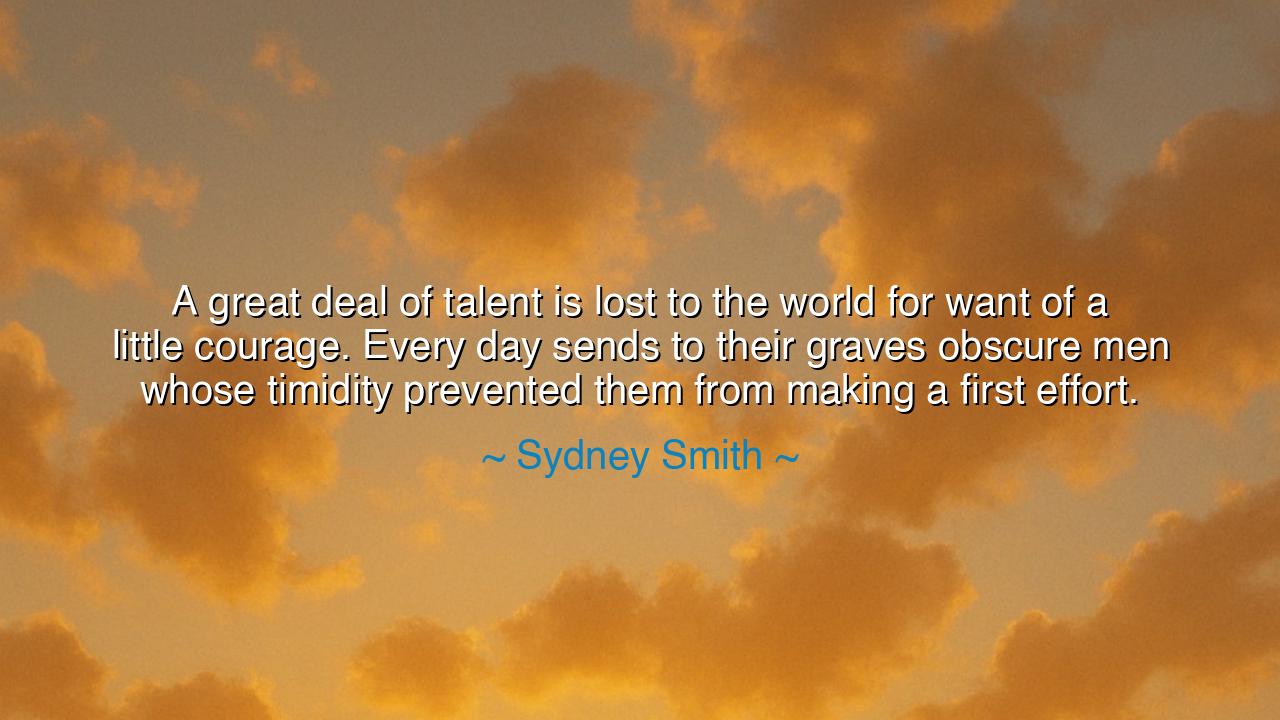
A great deal of talent is lost to the world for want of a little
A great deal of talent is lost to the world for want of a little courage. Every day sends to their graves obscure men whose timidity prevented them from making a first effort.






The eloquent Sydney Smith, a voice of wit and wisdom in the age of reason, once proclaimed: “A great deal of talent is lost to the world for want of a little courage. Every day sends to their graves obscure men whose timidity prevented them from making a first effort.” In these words lies an eternal lament and an eternal call—a lament for what has been buried without being born, and a call for every soul to rise against the quiet tyranny of fear. For it is not poverty, nor fate, nor lack of genius that silences most greatness, but the trembling of the heart before its own possibility.
In every age, countless lives have passed unnoticed, not because they lacked talent, but because they lacked courage—that divine spark which transforms potential into creation. Smith’s words remind us that the world is not short of brilliance; it is short of boldness. Timidity is a subtle thief, stealing not from the body but from the soul. It whispers to the artist, “Do not paint,” to the thinker, “Do not speak,” and to the dreamer, “Do not begin.” And so, masterpieces remain unpainted, discoveries unmade, destinies unfulfilled. The graveyard, as another wise man once said, is the richest place on earth—for in it lie the unwritten books, the unsung songs, and the unspoken truths of those who feared their first effort.
The origin of this truth was well known to Sydney Smith, a clergyman and essayist who lived in a time when convention reigned supreme. He saw that society prized propriety over daring, and so many gifted souls remained silent, trapped by the fear of failure or ridicule. His words were a plea to awaken the sleeping courage in the hearts of men and women—to remind them that the first step, however small, is often the most heroic. In his age, as in ours, the world bowed to the safe and familiar, while those who dared to be different often stood alone. Smith’s wisdom sought to rekindle the flame of action against the chill of hesitation.
Consider the story of Vincent van Gogh, a man whose life perfectly mirrors the essence of Smith’s message. Van Gogh possessed immense talent, yet for years he was haunted by timidity, by doubt and despair. He feared his work was worthless, and he sold almost nothing in his lifetime. Yet he painted—again and again, in defiance of fear, in defiance of obscurity. Though he died unrecognized, his courage to act—to make that first and second and thousandth effort—transformed the world of art forever. How many others, like him, might have illuminated the world, had they not been silenced by self-doubt before their hands ever touched the canvas?
The ancients too understood that courage was the root of all creation. The philosopher Aristotle taught that courage is the first of virtues, because it makes all others possible. Without it, wisdom stays unspoken, justice remains unenforced, and love remains unexpressed. To act, one must dare; to dare, one must believe that the risk of failure is less terrible than the cost of inaction. The coward’s comfort may seem safe, but it is the safety of a cage. Smith’s quote calls us to tear down that cage and walk into the open air of our destiny, trembling but free.
Yet let us not mistake courage for recklessness. Smith speaks of “a little courage”—not the roar of the reckless, but the quiet resolve of the sincere. Often it is not grand gestures that define the brave, but small beginnings. The act of writing the first line, of speaking one’s truth aloud, of stepping forward when fear commands retreat—these are the seeds of greatness. The hero is not born fearless; the hero is born trembling, yet moves forward nonetheless. Each small victory against timidity strengthens the will, until the timid heart becomes the courageous one.
The lesson, then, is both gentle and powerful: Begin. Do not wait for perfect confidence, for it will never come. Act now, though your hands shake. Speak, though your voice quivers. The world does not need your perfection—it needs your effort. Every great work began as a trembling first step, every great name was once obscure. You cannot steer a ship that never leaves harbor; you cannot fulfill your calling while hiding from it. Let your courage be greater than your fear, and your effort greater than your hesitation.
So remember, O seeker of purpose, the words of Sydney Smith: many are born with talent, but few dare to use it. Do not let your gifts perish in silence. Make the first effort, however small, and the path will unfold beneath your feet. The world awaits your voice, your light, your creation. Fear may accompany you, but it need not rule you. For in the end, it is not the timid who are remembered, but the brave—the ones who dared, despite trembling, to begin.






AAdministratorAdministrator
Welcome, honored guests. Please leave a comment, we will respond soon